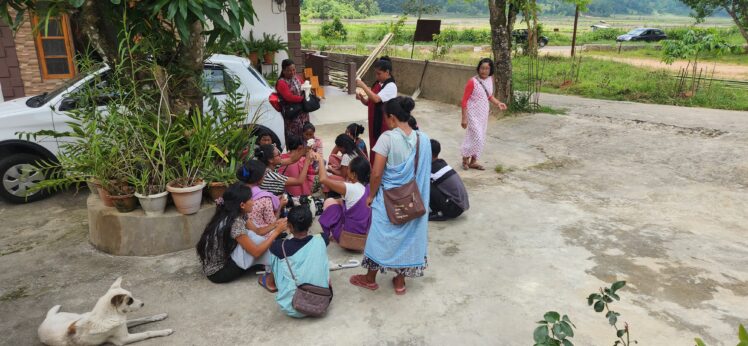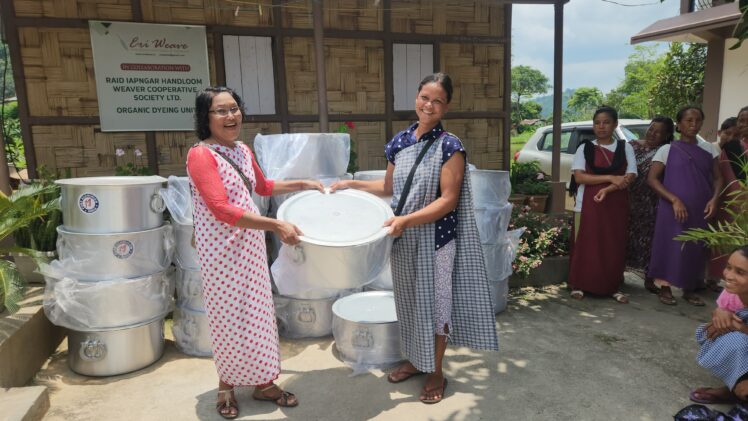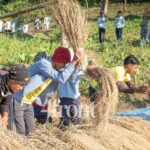
(By Ibalarishisha Syiem)
Kdonghulu | Ri Bhoi | For decades, the women of Kdonghulu, a village 40 kms from the capital city of Meghalaya struggled, with a simple but hindering problem: boiling their silk cocoons in tiny, rusted tin pots that barely lasted a few months.
Half a kilogram at a time, often in discarded cooking vessels or oil cans. It takes two hours for each batch. Firewood burns away, soap dissolves, time disappears from women who already had none to spare. The return? Sometimes only ₹ 1000-2000 per month. But, what if a small change, a sturdier and bigger pot could transform their daily lives?
What if something as ordinary as a pot could mean more income, more independence, and a stronger future for families in this handloom village?
On June 14, 25 women gathered to receive new cocoon-boiling vessels as part of an initiative led by Eri Weave. This was supported by the CGLS STEP Incubation Centre, Uttar Pradesh, under the Startup India program. Another batch of 25 women will receive pots in the coming months, with the full initiative aiming to benefit 50 women across 5–6 villages in the region.
ALSO WATCH:
Speaking about the initiative, Iaishah Rymbai, founder of Eri Weave, shared that the aim of distributing the cocoon-boiling pots is to boost productivity for both the women and the company. “Earlier, they used makeshift tins that didn’t last and weren’t efficient,” she said. “These new pots can boil up to 1 kg, cutting down time and helping them spin more thread, which will, in turn, make more profits for them and for our company”
She explained that the first 25 pots were given to women who are actively contributing yarn, with another 25 to follow. “We hope this encourages others to work harder. It’s a benefit for all,” she added.

Upgrading Equipment, Empowering Women
Traditional tin pots, often repurposed containers, rust quickly and hold only half a kilo of cocoons at a time, taking two hours per batch. The new pots double the capacity and are more durable.
“I used to boil just half a kilo at a time, and had to repeat the whole process for more,” said a weaver who has been doing the work for five years. “Now I can do one kilo at once. It saves so much firewood and soap.”
For some households, this is the only source of income; for others, it’s the difference between dependence and independence. One woman proudly shared how her earnings now cover groceries and school fees and she no longer needs to rely solely on her husband. The work is often done in spare moments, early mornings, late nights, or between farming chores, echoing Eri Weave’s motto, “Kamai haba shongkai,” earn while at leisure, where even spare minutes are turned into opportunities for income.
ALSO WATCH:
A Dream Born in 2018
Iaishah Rymbai founded Eri Weave Pvt. Ltd. in 2018 to build sustainable livelihoods for women through Meghalaya’s rich eri silk tradition. Aware that many women weavers lacked formal education and market access, she set out to bridge that gap, connecting their skills with real opportunities. What began as a small effort has grown into a rural enterprise supporting over 200 women, many of whom now sell their processed yarn directly to Eri Weave, easing the struggle of finding buyers. She hopes that the hard work of these women who are carrying forward this rich tradition gains the recognition and income it deserves.
One weaver shared that with the machines provided earlier by Iaishah, they are already spinning faster, and now with the new pots, they can boil more cocoons, adding that if they continue working hard, they can earn up to ₹10,000 a month.

Skills, Not Just Tools
Eri silk, or “peace silk,” is native to the region and prized globally for its cruelty-free process, natural dyes, and unique texture. As part of its mission to build a self-sustaining rural network, Eri Weave trained 50 women last year and plans to train more in eri silk production, organic dyeing, and loom operation.
Labeini rymbai, Iaishah’s daughter and one of the Directors at Eri Weave added that any woman interested in learning is welcome. “We are open to anyone who wants to learn,” she said. “If they come to our centre, we are ready to help and train them.”
Leaving no one behind
One visually impaired weaver shared, “Boiling is hard for me. My siblings help sometimes. Even if I do just half a kilo in a week, I earn a little for medicine or clothes.”
The gratitude is unanimous. “We’ve received a lot of help machines, training, and now these pots,” said one woman who is expressing her gratitude for the continued support of Kong Iaishah through her various ventures.
To the donors and organizations behind the initiative, “May God bless you. This has truly helped us” said the weavers.

Looking to the Future
Even with strong local production, access to markets remains a challenge.
“Most of the women aren’t formally educated,” said Iaishah. “They don’t know how to sell outside. That’s why we need young people, not just to weave, but to connect us to buyers and bring the market” she added, encouraging the new generation to pursue education not only for themselves, but to uplift and strengthen the traditional practices handed down by their elders.
Eri Weave’s journey has already taken them to national stages, including a pitch on Shark Tank India, helping draw attention to the potential of Meghalaya’s eri silk and its artisans. They have even expanded to international markets where Kong Iaishah has represented the company and showcased Meghalaya’s eri silk products. These efforts are planting seeds of hope, that one day, the delicate threads spun by women in small village homes may be worn, admired, and valued in homes around the world.
What began as a humble local initiative has become a hub of empowerment, a company run by women, for women. While a few men are also part of the production chain, the heart of Eri Weave beats strongest for the women who are keeping the craft alive, even when life leaves them with only a few hours of spare time.
As the event ended, many of the women expressed heartfelt gratitude to CGLS STEP Incubation Centre, Uttar Pradesh, whose support under the Startup India program made the pot distribution possible. Initiatives like these demonstrate how meaningful change often begins with small, thoughtful intervention. As Meghalaya’s handloom sector gains national and global attention, sustained support from programs like Startup India will be crucial in turning potential into progress.
Because when a woman no longer spends hours over a flame just to earn a little…
When her work, once overlooked, begins to earn her dignity…
When her craft, deeply rooted in heritage, finds a place on the global stage…
Then a simple pot is no longer just a tool.
It is empowerment made tangible: a vessel for progress, independence, and efficiency. The fire still burns in Kdonghulu. But now, it’s not just smoke rising, it’s hope.






